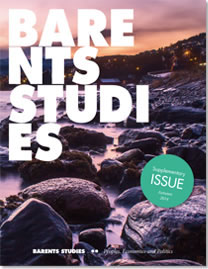The regional symposium Barents Studies: Past, present and future was organized at the Arctic Centre on the 4.-5. of November. Missed it? No reason to worry - NPE team's research professor Monica Tennberg summarized the highlights of the seminar for you.
 It was a great surprise to me personally – and a nice one. The Barents Studies symposium in early November in Rovaniemi to discuss the past, present and future of regional studies included excellent, diverse presentations and drew a considerable group of people together to listen and discuss these presentations. The day highlighted the many connections between Barents and Arctic studies, importance of local and community approaches to development in the region, and also showed that we have a younger generation of researchers interested in the region and its development. The event also was launch of the popular Barents Studies issue which is one of the products of the Barents Journal project. The event was organized as a final seminar of the Barents Journal project funded by the Kolarctic ENPI project (2013-2015).
It was a great surprise to me personally – and a nice one. The Barents Studies symposium in early November in Rovaniemi to discuss the past, present and future of regional studies included excellent, diverse presentations and drew a considerable group of people together to listen and discuss these presentations. The day highlighted the many connections between Barents and Arctic studies, importance of local and community approaches to development in the region, and also showed that we have a younger generation of researchers interested in the region and its development. The event also was launch of the popular Barents Studies issue which is one of the products of the Barents Journal project. The event was organized as a final seminar of the Barents Journal project funded by the Kolarctic ENPI project (2013-2015).
In more detail, the symposium approached at the Barents studies from different perspectives. In the first session, Peter Sköld (University of Umeå, Sweden) talked about challenges in Arctic research and increasing Swedish interest to Arctic studies. Larissa Riabova (Luzin Institute of Economic Studies, Russia) discussed the past and current studies on community viability, capacity and resilience in the Arctic and in the Barents Region, especially on the Russian side. Aileen Espiritu (Barents Institute, Norway) focused on a future studies perspective to Barents Studies while Monica Tennberg (Arctic Centre, Finland) looked at the development of political studies on regionalism since the early 1990s until today.
The second session of the day focused on concrete, practical projects related to the Barents Region. Pekka Huhtala from Salla municipality, Finland, near the Russian border shared some views on the cross-border development and cooperation. Minna Turunen (Arctic Centre, Finland) presented the plans for a Barents regional integrated assessment report project under the auspices of the Arctic council and AMAP which is part of a pan-arctic integrated assessment work. Leena Suopajärvi (University of Lapland, Finland) discussed the issues related to mining, especially the question of social license for mining, in the Barents region with a presentation about the SUMILCERE project. Finally, Marjaana Lahdenranta from Regional Council of Lapland, presented latest news from Kolarc ENI plans.
The next two sessions focused on students presentations in “The Young Barents Researchers’ Forum”. Satu Ranta-Tyrkko (University of Tampere, Finland) presented plans to do a comparative study on Northern Finland and India on impacts on disadvantaged people from mining. Gregory Poelzer (University of Technology in Luleå, Sweden) discussed the role of regional actors and policies in participatory processe in Swedish mining. Heidi Sinevaara-Niskanen (University of Lapland, Finland) discussed the gender aspects of Arctic developments. Sander Goes (University of Nordland, Norway) talked about power, trust and networking in Norwegian-Russian cooperation on higher education. Nafisa Yeasmin (Arctic Centre, Finland) presented her study on cross-border halal trade in the Barents Region and Ilona Mettiäinen (Arctic Centre, Finland) discussed the plans to develop municipal and regional climate strategies in the Barents Region. The symposium ended in a positive feeling about the future of the Barents Studies and its relevance.
Want to know more about Barents Studies? Have a look at the popularized supplementary issue of the Barents Journal!
Text: Monica Tennberg